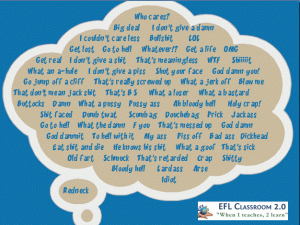Cursing and Swearing
As a teacher, I really didn’t follow the standard “levels” of fluency – all those test numbers or beginner – intermediate – advanced. No, I had my own standards, my own way of placing this bar.
For me, there were only 3 levels or abilities.
1. able to answer all the general questions and maintain small talk.
2. able to order pizza over the telephone in English (and get the pizza).
3. able to cuss and swear and make the other person feel it.
Yes, swearing and insulting are the highest art of our language. Full of nuance, subtlety and at the same time – force. Full of paralinguistic features, body and eye language. If you can swear like an Englishman, you could feel at home with the language.
Swearing/cursing/insulting are important for our students. They are important subjects. Swearing (and politeness) are the core of discourse analysis and are very serious subjects in their own right. Our students need to know about these things…
Students love any lesson about insulting and swearing. They were always my favorites, along with bragging. A knock ’em down good time. I think the reason was that it brought us together – we were in “taboo” territory, English language or not. Also, and most importantly, we were engaging the ego. I think the ego is something that is powerful when it comes to language. It is beyond personalization but rather the commitment body, tongue and soul, of the student to the language produced. That’s why all language should start with ME and all language should end with the art of belittlement.
It isn’t easy to do a lesson on swearing. Karenne has a nice blog post about Eminem and challenging students with this type of “dirty” content. A good read. Myself, I feel we teachers have to respect our audience but can stretch things. So it all depends what you can get away with – but be cautious and edit out any of the hard core stuff. You’ll be surprised at how much your students do understand! And they might just tell someone, who will tell someone and then you’ll be out on the street, just another language teacher has been…. but at least you’ll be able to tell them to ……
This Korean teacher is really brave, teaching his students about swear words! Funny version
But if you can, go for it. These examples are stellar. The one above – less dirty, the one to end, full of the more powerful dirty stuff.
To end, if you can get away with it, give your students some practice swearing. It will even be a good way for them to let off steam! There is nothing like swearing in a second language (sex aside)…..
Some Resources: The swear word dictionary. The word fuck.








I agree teen students feel powered up when they learn how to swear in a foreign language: as non native myself, I remember growing self-confident and able to casually handle English every time I learnt how to combine a swear word and a particle and had the opportunity to try it out. In fact, any out-of-the-classroom exposure to real English that a teenager may find amusing will include some kind of swearing component (songs, tv series, films, social networks).
However, as I recall my own experience as a learner, I tend to think that teachers should be cautious when tackling this issue: Cursing is something FL students normally feel extremely enthusiastic about and, a well-meaning lesson plan on swearing words might eventually result in overuse. Students should be taught not only how to swear, but when to do it.
I agree with Paco that students are very often exposed to this language outside the classroom and that when we teach it, we should not only teach how to use but when. People in the area where I live (the south of Spain) swear much more freely than people in my hometown, but often they aren’t really “swearing”: the language they use to communicate with each other is simply full of swearwords. It’s also important to highlight to students that swearwords often don’t translate literally and a lot can be lost, misunderstood or cause offence when they are used incorrectly.
So true, what both you and Paco said. It is a complicated (high order) part of language, so we have our jobs cut out…. but the point is that I think we shouldn’t be scared of testing out, trying out these “foaming” waters. Students connect to this kind of language and come alive. My motto as a teacher (if I’m in the right school / teaching situation) is to get away with all that I can!
But video nowadays helps with all the contextual and paralinguistic “stuff” that makes swearing and insulting so difficult. A little help anyways. But even discussing translation and that things don’t translate the same – is revealing for many students. There are cultures / languages where calling someone a cockroach is a compliment!
Yes! This is what I’ve always said — of course, I might have been overdoing it when I got my mother into trouble for letting me work at her school (she was the principal, but lost her job a few years later). The full story : http://onoldage.wordpress.com/2014/01/19/day-19-deliberately-learn-five-new-words-at-least-twice-a-week/
I found this article very interesting and have actually been involved in research into the issue of teaching taboo words (and topics) and profanity in EFL classes.
The research I did was conducted in order to get a deeper understanding of the opinions and attitudes that adult EFL learners in Korea have regarding this delicate issue. So if you have the time then please check out my article and lecture on the subject: http://www.joshesl.com/taboo–slang.html
Thanks,
Josh